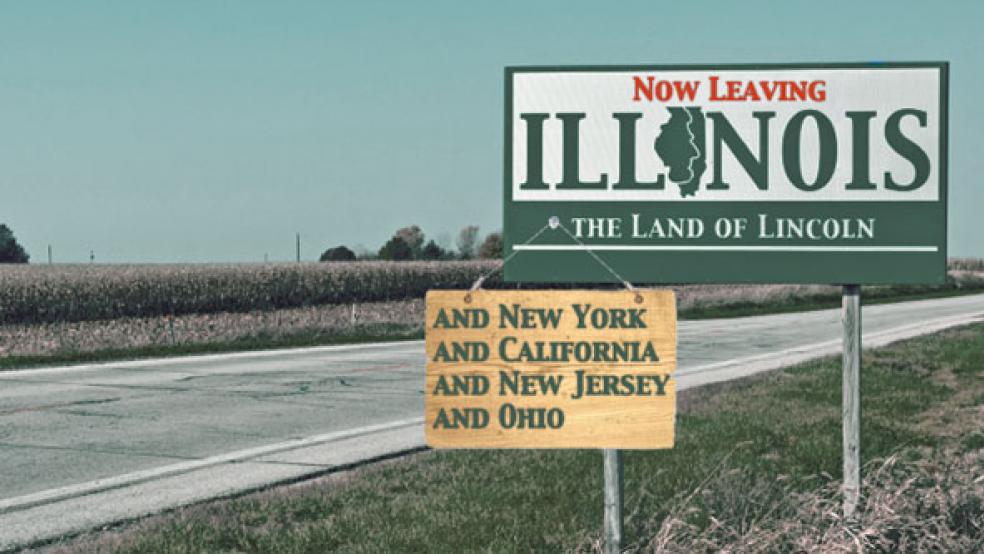The past few years have really put the squeeze on cash-strapped states to find new sources of revenue. This environment has generated a level of tax aggression from certain states, which in turn has resulted in a net loss of revenue instead of the intended gain. Residents have begun voting with their feet, deciding to move out of the state instead of thinning their pocket through unwanted taxation. So which states are chasing away their residents? And how does it impact you if you live in one of them? We track migratory patterns through our residency product data, and while some of the states are no-brainers, others may surprise you. Following are our top five ‘shrinking’ states in ascending order:
- Ohio: The Buckeye State is one of the few around that actually has a balanced budget. One of the reasons is because they tax their residents so well. The interesting part about Ohio though, is that a constant stream has always existed out of the state. Some of the migration is probably due to weather, but they also have very strict well-defined rules surrounding residency. Ohio’s Bright-Line Test names the specific number of days over, under, and in between that dictate someone as resident, non-resident, or other (the burden of proof is on the resident in question for ‘other’). These rules make it simple for an Ohioan to decide whether to stay put or make a run for it.
- New Jersey: Oh, Jersey. Always the brunt of jokes, our most densely populated state, and a bastion of high taxation. Including local taxes, New Jersey has the highest tax rate in the country. Without going into painful detail, the cocktail of crowded, expensive, and verbal assault makes the Garden State an easy exit for most.
- California: The Golden State is nearly a tie for the number-two spot, and we are constantly surprised it isn’t at the top of the list given the fiscal issues present there. Municipality balance sheets are in shambles, the state already has high tax rates, and many residents are staying close but merely hopping the border into more tax advantageous states like Nevada. Yes, the weather can be great, the people creative, and they still have one of the most productive economies around, but we haven’t seen a decrease in the flow of residents out of the state which is always a cause for concern.
- New York: One of the easy guesses for sure. New York has been bleeding residents for some time. Tom Golisano, the founder of Paychex (NASDAQ:PAYX), wrote a letter that was published in the New York Post about why he was leaving the state. And he didn’t mince words, explaining he was taxed out of the state for greener pastures to no-income-tax Florida. And it shouldn’t be a shock, Florida welcomed him with open arms.
- Illinois: This comes as a surprise to many, but Illinois has seen a huge exodus of residents in the past few years. The state recently increased their income tax by approximately 67%. That is an incredible jump, so it stands to reason residents are looking for a way out. Our residency lectures are consistently filled with more Illinois residents than any other state, hands down. Ironically, the Land of Lincoln could lose enough pennies through attrition that its financial problems only worsen.
Local economies thrive on new residents. Small business incubators are popping up in every town in an effort to attract new employers. New employers bring fresh talent, and those folks are also consumers. Building a better base to tax through low tax incentives is working for states like Texas and Florida.
Cities and states always have an ebb and flow in population, but if you are in a state with a decreasing population it could impact you in the way of higher taxes (to make up for lost revenues), a less healthy economy (less people to buy stuff), and possibly less pay in your pocket (as a result of shrinking business revenues). This ‘sucking effect’ of residents flowing out of the state can be a self-fulfilling feedback loop that decimates a region. The analogy of rats jumping off a sinking ship might come to mind.
Realistically we know that these states have natural resources and industry like coastlines, mining deposits, etc. that will always warrant some type of population, but it is worth considering where your state falls in the big economic picture because, well, it can have a direct effect on your own.
Follow ResidencyHQ on Twitter @ResidencyHQ.
This story by ResidencyHQ originally appeared at Minyanville.
More from Minyanville:
Stumble Off Cliff Won't Matter in Long Run, Case-Shiller Says




